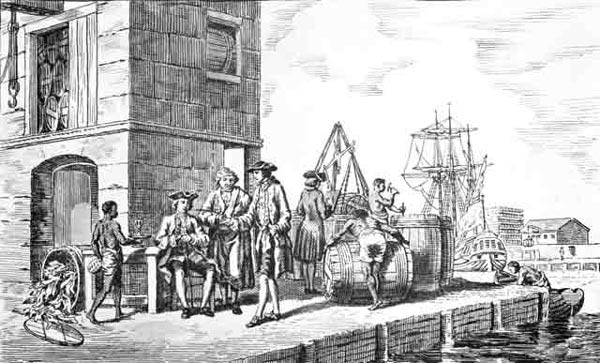Smallpox inoculation and quarantine in colonial America
By Kristopher A. Nelson
in
March 2010
600 words / 3 min.
Tweet
Share
In colonial America, quarantine was a state-sponsored restriction on individual liberty in the name of public health, and was accepted by the public. Early inoculation, on the other hand, was done by individuals, and was immediately resisted by the public.
Please note that this post is from 2010. Evaluate with care and in light of later events.
In the seventeenth century, colonists in America, despite “strong religious beliefs about pestilence-as-divine-punishment,” readily made the connection between arriving ships and outbreaks of smallpox. Their populations, unlike urban centers in Europe where outbreaks appeared random, were not sufficient to sustain smallpox as an endemic virus. Thus, outbreaks tended to occur with the arrival of ships, and could not be blamed on “unsanitary neighbors,” as in Europe.
The earliest step taken by European settlers in North America, then, was the quarantine of arriving ships. Some extended this approach beyond maritime quarantines to include isolation of victims to prevent the spread of the disease, including early legislative attempts in the colony of Virginia in the 1660s.Charleston, South Carolina mandated the isolation of smallpox victims at home as of 1738. Boston and New York City both established quarantine stations as of 1717 and 1755, respectively.
In 1721, Reverend Cotton Mather and Dr. Zabdiel Boylston introduced inoculation in the fight against smallpox for the first time, a move that “provoked a violent controversy.” Inoculation brought forth stronger claims of personal autonomy and liberty than quarantine had, likely because they involved purposefully infecting an unexposed person with a potentially deadly disease, as opposed to the maintenance of a kind of status quo as with quarantine. Inoculation was viewed by some, especially by Puritan New Englanders in the early eighteenth century, as “interfering with the will of Divine Providence” in a way that quarantine did not. Smallpox and other diseases were God’s “mechanisms for controlling the balance between the blessed and the damned” and served “as natural controls over the size and extent of the poorer populations.” According to James Hodge and Lawrence Gostin, “[t]his Malthusian analysis was one of the most widely quoted theories of the early antivaccinationists.” This view survived well into the twentieth century.
Reactions in 1721 were violent. In the midst of Boston’s smallpox outbreak, Mather and Boylston began inoculating patients, beginning with Boylston’s son. They were roundly condemned: “Physicians, ministers, and citizens were outraged and horrified that Boylston had deliberately infected someone with smallpox.” Both received death threats, and Mather’s house was attacked with a homemade grenade.
Many opponents of immunization were especially concerned with the potential danger of actively spreading smallpox to a community through the means of inoculation, a very real possibility when dealing with a live smallpox virus (instead of Jenner’s much safer vaccinations with cowpox virus). From a religious perspective, this kind of interference broke the “covenant between the community as a whole and God.” With inoculation in play, “no longer could the people be told convincingly that their suffering resulted from their sins, or that repentance was the only road to salvation.” From a medical perspective, intentional infection with smallpox could be seen as contradictory to the Hippocratic oath and general tenants of medical ethics.
Early approaches to mandatory public health measures lacked the concept of a legally-articulated “exemption” from the policy for individuals. Any exemption or exception was applied in an ad-hoc manner, even as many public health interventions were, in fact, ad-hoc responses to circumstances. Mather and Boylston, for example, acted as individuals, not as public health officials, and their inoculations were neither systematic nor comprehensive. Quarantine, on the other hand, was state-sponsored. It would be applied to incoming ships if smallpox was suspected, but there was no articulated provision for allowing any particular to leave quarantine early. The concept was to protect the public as a whole, not to preserve individual liberties.
You can read my working paper, “Lessons from Smallpox Vaccination,” in its entirety on SSRN.
